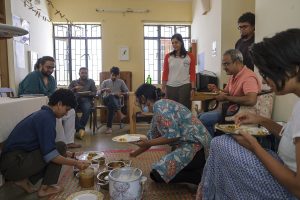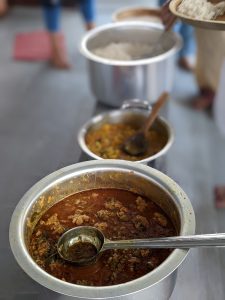Sri Vamsi Matta’s performance in ‘Come Eat With Me’ asserts his identity, speaks of Dalit food, and portrays stories of survival.

As part of the performance, Vamsi goes to people’s homes, cooks for them and tells them stories behind Dalit cuisine. (Vivek Muthuramalingam)
Koduvaru namage jola
Kadime haakuvaru kaala
Aaguttade rakta bedhi
Aadaroo kodalollaru ragi godhi.
(They gave us maize
And very little gram
Blood goes in our motions
Yet they refuse us ragi and wheat).
These lines were spurred by the outrage Dr Siddalingaiah felt during his stay in a hostel for Dalit boys in Srirampura, Bengaluru. The Kannada poet, writer, and folklorist mentions in his autobiography, Ooru Keri, how food served to the inmates was not good. The boys would have blood in their stools after eating maize muddle, he wrote.
Siddalingaiah went on to become the founder of the Dalit Sangharsha Samiti and fought hard for Dalit rights until his untimely death due to Covid-19 last year.
While Siddalingaiah is probably among the first few Dalit writers who initiated a conversation on caste-based food, he is certainly not the last.
Twenty-nine-year-old Sri Vamsi Matta is doing his part with a theatrical project titled ‘Come Eat With Me’.
Vamsi has a BSc degree from the Indian Institute of Science (IISc) in Bengaluru. Originally from Visakhapatnam in Andhra Pradesh, he moved to Bengaluru in 2011 for his higher education. Little did he know that this move would take him on a career path he barely anticipated.
While pursuing his bachelor’s degree, Vamsi was drawn to the theatre society on the IISc campus.
“I have not studied theatre, but was largely interested in it,” Vamsi tells South First. “A lot of the artists who were part of the collective were doing it for a long time.”
Vamsi’s decision to join the troupe was an organic one. His father, Dr Matta Suguna Rao, is a Telugu writer and has heavily inspired him.
Storytelling was part of Vamsi’s childhood.
“As a child I remember my parents, both doctors, would be excited to see me perform at school. These ranged from a dance to a skit. Since my dad is a writer, I also had access to rich Telugu literature which generally people of my age group might be deprived of,” he says.
So the idea of narrating stories to people was always a part of Vamsi. He has been performing professionally for 10 years now.
How the idea of ‘Come Eat With Me’ came to him is part of the show, he says, politely declining to reveal it all.
He, however, shares that a look at the culinary history of India got him thinking: “What is my food?”
“In trying to understand what that was, I went down a rabbit hole — where do I find it [the Dalit cuisine], I wondered.”
Many Dalit memoirs mention the cuisine that members of the community ate.
“There is a lot of storytelling around food. It is an imperative aspect of our lives. That is when I thought, let me do something about it,” he says, adding that his first show was held in March 2022.
As part of the performance, Vamsi goes to people’s homes, cooks for them and tells them stories behind the Dalit cuisine.
He has done 20 shows so far, the most recent being the ones in the national capital.
“Initially I would only do intimate shows for a smaller audience,” he says. “People would sign up, I would go to their homes and perform. I would also ask them to bring in their cooked food.”
Recently, Vamsi has started doing shows for a much larger audience of 50 people. The four shows in Delhi could happen thanks to the Refunction grant Vamsi received from the Goethe-Institut/Max Mueller Bhavan, New Delhi..
All his shows are in English. “It is my political language, that is why it is also my artistic language,” he says.
As much as ‘Come Eat With Me’ is Vamsi’s story, it is also a story of 200 million Dalits living in the country.
“People should know this,” he says.

Sri Vamsi Matta is a theatre practitioner from Bengaluru. He has done 20 shows of ‘Come Eat With Me’. (Vivek Muthuramalingam)
The “this” Vamsi refers to is the caste-based food he grew up eating.
“In my teenage years, I realised something different about our food,” he recalls. “That is also the time I started learning about my identity, who Dr Ambedkar was, how food, especially the food in Dalit weddings — both Hindu and Christian — was so different from the ones that were not our [my] kind. But as an adult, once I started engaging with caste through politics and art, I understood this better.”
In Vamsi’s Visakhapatnam home, the usage of garlic and onion in pappu charu — a watered-down version of sambar — was common.
“Both my grandmoms would make seafood curries with a lot of vegetables. First I thought it was a style they liked, but now I realised it is also absolutely genius!”
Genius, because these food fixes stemmed out of the need for survival. The community had little to no access to some foods that people from other castes could easily procure.
“When there are more than five members in the family, sourcing seafood would prove costly at the time. By adding more veggies to a seafood curry, my grandmother tried to serve us a meal that was delicious nonetheless. It was genius because the dish tasted incredible in the end. In short, her experiment worked,” he tells us.
Both his parents hail from the Godavari district — a coastal fishing region. And so, rice and fish became an obvious staple diet for the people.
“Prawns and crabs were very important in our meals,” adds Vamsi, a self-confessed foodie.
Not just food, around this time Vamsi also realised how his language and how his people were different.
“Some friends would say they have relatives in Hyderabad or some other city, but no one seemed to be talking about relatives in the villages,” Vamsi remembers.
“That was probably one of the first moments I felt a cultural difference. Some friends didn’t have ancestral homes in villages, and if they did, they were from the land-owning castes, people with a lot of capital and would go to vacations in places like Mumbai or Delhi, or even abroad.”
Vamsi always asked himself “why not me” or like “how is that even possible”.
So does it pain him to reminisce about the unfair practice of discrimination based on caste, we ask.
To which, Vamsi says: “It is always a conflict.”
“When you see expressions, both academic and artistic, around Dalit food or Dalit culture by the Savarnas, there is this tone of sadness or pity. But when I decided to talk about the stories of the marginalised in ‘Come Eat With Me’, I wanted to tell the joy aspect of it as well.”
So while Vamsi’s performances aim to defy everyday injustices, they also are an effort to remember the unique Dalit cooking habits. His shows are not just about sadness and pain. They are more about how food became an identity marker for Dalits.
There is a set, a script, music, sound, lighting and everything else that a theatre show has.
“So far, I have had a complete audience for ‘Come Eat With Me’,” he smiles.

Inspired by his mother’s recipe, chicken curry with rice is served to the audience in one of the shows. (Apeksha Vora)
But while he is riding the crest of a wave of his show’s popularity, Vamsi says he wants to continue the conversation on centuries of oppression in other forms. A book perhaps, or an art installation. Maybe even a multi-media project!
“I am also a graphic designer, so I am trying to use that medium as well. Right now, I am trying to re-orient myself and understand what I can do with this.”
Conversations about food always remind Vamsi of his own memories. To this day, he says, his favourite meal is his mum’s chicken curry and rice. Instead of cashews, she used poppy seeds to make the creamy curry.
“I lost her a few years ago. Standing next to her in the kitchen as she cooked has to be one of my best memories. But having said that, any meal with a loved one and a whole lot of conversation and sharing is a favourite meal.”

Apr 25, 2024

Apr 25, 2024

Apr 25, 2024

Apr 25, 2024

Apr 25, 2024

Apr 25, 2024